Photographs: Rajesh Karkera/Rediff.com Archana Masih
At the Line of Control, young Indian soldiers -- in their 20s and 30s -- defend one of the world's most volatile borders.
Battling harsh weather, tough terrain and a hostile enemy -- as old as the Indian nation itself -- these soldiers face a war every day to hold the peace.
Rediff.com's Archana L Masih reports from Indian Army posts along the Line of Control.
Photographs: Rajesh Karkera/Rediff.com
"Line of Control -- what comes to your mind when you think about it?" asks Major Anurag Chaturvedi, sitting in the front seat of the Maruti Gypsy as we drive towards a forward post guarding the LoC in Jammu and Kashmir.
The officer, a native of Rajasthan, is stationed at a place which does not have a name; only a number -- indicating its location from sea level.
This morning he has left at 4.30 am to pick us up -- soldiers at the LoC say their day begins at night when infiltrators often use the shroud of darkness to cross into Indian territory.
But that hardly means that the day is any better and to prove this the commanding officer of one of the battalions guarding the LoC stops the car en route and asked, "Can you see anything beyond the periphery of this forest?"
You can't.
It is early afternoon and it is calm. There is a stillness in the wooded landscape flecked with hills, the last village is left 15 kilometres behind, ahead lies the India-Pakistan Ceasefire Line, famously known as the LoC, defended by the Indian Army -- where at one point in this area the enemy post lies just 70 metres away.
Here 'Eyeball to Eyeball' is not just a figure of speech; it means that and only that.
From these border posts, soldiers keep a strict watch -- 24x7x365 -- defending the Line of Control. Keeping a day and night vigil to prevent Pakistani infiltrators from crossing into India.
Please ...
'You have to know the LoC with your eyes closed'
Image: The LoC along the J&K border is defended by the Indian Army's soldiers who guard their posts 24x7In the distance, across the landscape scattered with mine fields, one can see the Pakistani posts -- on a hill, or another on a pointed tip, among a grove of trees under a star and crescent flag.
"He is watching us. As we are moving, he is observing us at places. He must know we have visitors," says an officer whose unit is in-charge of manning a chunk of the ridge along the LoC and the electric fencing that lies behind the LoC on the Indian side, constructed in 2004.
Officers here often refer to the enemy as 'he' and the Line of Control as 'LC.' They say they have to know the location of the Line of Control like the back of their hand.
On the map it is another thing but on the ground, this is no physical boundary drawn by a painted line -- in this famously treacherous terrain the LoC is identified by physical features -- "that tree, that hill, that rock, it runs between those hills with tall trees, through that river..."
"If you are posted here you have to know the LoC with your eyes closed -- even if you are blind," says Colonel Rakesh Nair, a proud second generation soldier from the Gorkha Rifles, who has served with the Rashtriya Rifles fighting insurgency in the Kashmir valley -- also in the Siachen Glacier and in Lebanon on a United Nations Peacekeeping Mission.
"When the winter fog comes in, you won't be able to make out whether you are seeing a rock or a man if it is stationery -- and still this area is better. It keeps getting worse if you go higher in the Kashmir valley," says another officer, who has been stationed in the area since last year, someone who prefers these field postings to peace stations.
"People ask you guys are there at the border and still infiltration is taking place?" adds an officer, "This is a physically manned border, and you can't have a man on every inch of land. You will be at tactically important places, but that does not guarantee he'll come to those places, he'll come to any place."
Last year, 15 Indian soldiers lost their lives in counter infiltration/counter-terrorism operations; 45 others were seriously injured defending the border in Jammu and Kashmir.
One of them, Lieutenant Navdeep Singh -- who was awarded the Ashok Chakra, the highest gallantry award in peacetime this Republic Day -- was just 25 years old.
Please ...
'If this post goes, the battleground is lost'
Image: Pakistani artillery shells on display at a postThe posts are small -- almost makeshift structures -- but are formidable and crucial to India's defences.
Some have seen bloody action in every war with Pakistan, where men have had to fight to the last man and the last bullet in the face of enemy attack.
"The post was attacked by Pakistan several times -- again and again -- over three days during the 1971 war, but it did not fall," a young officer entrusted with defending that post explains. "If this post goes, the battleground is lost. It will be very difficult to recapture it."
A different infantry battalion now mans this post. Most of its soldiers were not even born in 1971, but speak with great admiration of the soldiers who held on to this post unrelentingly 40 years ago. A small memorial salutes the men who died fighting here.
Up ahead, in the precincts of another post that gives us a bird's eye view of the LoC and Pakistan, is another memorial to those who died defending this front.
Apart from saluting our martyrs, it also extends solemn tribute to the fallen Pakistani soldiers -- 'Homage also to enemy soldiers killed' reads the last line of the plain marble plaque.
'We are Indian soldiers, we maintain decency even in war,' Amitabh Bachchan, playing Colonel Damle in the film Lakshya set during the Kargil war, had said -- but here a few hundred metres from a border that has seen many young men sacrifice their lives every year, everything is for real.
Here, even simple things like taking photographs of the landscape ahead can pose serious security threats. You may wonder how anyone can make out anything from a thicket of trees or a hill which could be located anywhere, but when across sits a hostile neighbour and guarding the border is a matter of life and death, these young men can never let their guard down.
"I will have to delete the pictures you have taken of the enemy post," a company commander tells my colleague Rajesh. "If it starts floating on the Net, a person who has served in that area on the other side will know the position from which this picture is taken."
Please ...
This is a job which comes with no weekend or festival breaks
Image: For the men posted here, life is tough -- away from human habitation, family, cell phones...The men here guard their territory zealously. Away from family, human habitation, cell phone communication, theirs is a 24x7x365 job which comes with no weekend or festival breaks.
Their post is their home.
"You could take a picture of my post from anywhere -- aerial view, bottom view, side view, sky view -- any which view and I will be able to tell you the line of sight from where you've taken it," says Major Anurag Chaturvedi, a tough officer who has served on the China border and was on the search team looking for the late Andhra Pradesh chief minister Y S Rajasekhar Reddy's helicopter in the Nalamalla jungles in September 2009.
To the lay-eye all posts may look almost alike. Some on towers, some in bunkers, with sandbags and narrow windows armed with sophisticated rifles aimed in readiness. Men in bullet-proof jackets and helmets, carrying guns as easily as we carry shoulder bags.
Raising a curtain made of bamboo logs stringed together, Major Neeraj Sundaram -- a second generation soldier also from the Gorkha Rifles -- points to the enemy posts across and in the direction from where Pakistani attacks have come in the past.
"That river that you see, we have to keep a watch on it because it has been used by infiltrators in the past," he says. "The difference between them and us is that they have villages upfront. They bring their cattle to the forward slopes to graze and these guys come along with them, have a look and go back. If five guys come, four may go back and one may stay back, so we have to keep a constant watch."
Please ...
At the LoC men begin to trust their ears more than their eyes
Image: Soldiers walk through a trench used for communication and transporting reinforcements during war.At another forward post reached after trekking through a trench, JCO Pandey nods when introduced as the post commander responsible for detecting any intrusion and defending that post with his men at all cost -- to the last man, last round.
A marigold bed leads to their small gate festooned with empty beer bottles that clink together when the gate is pushed open. A basic, yet dependable early warning system.
"You may have all your technological aids and alarm systems alright, but this will never fail you," says an officer with a laugh.
The stray dog being another dependable alarm that also serves as a stress buster for men at the border. At every post there is one -- in one battalion it is named dhaai, Hindi for two-and-a-half, which is a location within the post periphery.
Behind a bandh-cum-ditch, to counter an enemy tank attack, young Lieutenant K Navin Kumar, just out of the Indian Military Academy into his first posting, is located at a post almost breathing distance from the enemy.
"The listening drill is most important for us. We can hear them talk, listen to their vehicle movements," says the enthusiastic officer from the Grenadiers Regiment.
At the LoC, "where even moonlight does not reach some places," the men begin to trust their ears more than their eyes.
While the soldiers guard their posts, their team comprises an army dog and when they speak about the number of men stationed here, they make it a point to include the dog, a soldier in his own right.
Please ...
Here trust has no frivolous interpretation; it can simply mean 'I will die for you'
Image: A river without a road bridge, where a big vehicle carries smaller vehicles across.Food is made in a cook house at a larger post or sent to other posts from what is called a langar.
The jawans get meals according to the stipulated calorie count prepared for them and because of the difficulties of the terrain, ration is often transported on mules.
Life is hard at the border. To get to the forward areas is a four-wheel drive, through dry river beds, up hilly tracts where for vast stretches, the narrow road is only made of small round stones, and through rivers without bridges where the vehicle has to be mounted on to a big truck to get across.
In the rains, it is worse when scorpions and snakes come out to prey.
"Things that are taken for granted are a privilege here," says an officer. At one post, there is no electricity -- a generator is expected only by May.
The men stay in bunkers, their bags hanging on the wall carrying few belongings; magazine cut-outs of Hindi film actresses pasted by their small beds. There are common bathrooms and toilets, while there is a recreation room for off duty hours in the evening.
Subedar Gabbar Singh, the post commander at one post, will retire this year, after 30 years in the army. "I've served all 30 years in J&K," says the soldier from the Garhwal hills.
He hopes to get a job in one of the Uttrakhand government projects when he gets home, but at the moment he and his men are upset about retired Major General and former chief minister B C Khanduri's defeat in the assembly election.
"He was an army man and laid down the law like a fauji which people did not like," adds Lance Naik Dalbir Singh, who has two other brothers serving in the army.
The jawans discuss their state politics with the officers who do not come from their home state but from different parts of India, sharing an easy bonhomie that comes from having tested the odds together. The jawans have seen the officers grow up in the paltan and the officers are expected to give them their due.
Young officers who serve with the Gorkha Rifles learn Gorkhali, the language that they converse in with their men. Some officers are also sent to Nepal to better acquaint themselves with the culture of the men they command, since 70 per cent of Gorkha Rifles jawans come from that country.
There are jawans who carry on the tradition after their fathers have retired from the army, like the young Gorkha sepoy whose father was a drill instructor and gave march-past training to the athletes in the 1982 Delhi Asian Games and was called 'Jhandey Saheb.'
The officers are expected to know their men by name, even by their number; also know their families and solve their problems -- human factors that go on to build lasting trust.
Far from the comfort and security of our homes, these men live by a separate creed. Where a decision gone wrong can mean death, where trust has no frivolous interpretation; it can simply mean 'I will die for you.'
Please ...
'Though it looks very calm, it can explode any time'
Image: ine fields are laid to stop infiltration bids, while the fencing is made of menacing sharp metal"This corridor between these two famous rivers is very important from the military point of view since King Porus' time. It has seen every war with Pakistan," says Colonel Kulvir Singh, who has been twice awarded the Sena Medal for gallantry.
The colonel commands a bird's eye view of a beautiful landscape that goes into Pakistan. Through binoculars, the enemy posts are visible and in the distance are poles that flash when the current is switched on.
"500 metres beyond those flashes lies Pakistan and this side is us. We have to dominate these heights," says Colonel Singh as he explains the strategic points on the LoC.
The men manning the border say the winter has largely been incident free.
But peace lies behind a thin veil on the Line of Control, something that can be shattered any time. Down the road traversed by soldiers, two IED blasts have taken place in the last two years. In 2001, five soldiers going home on leave were killed in an explosion.
Guarding a hostile border is a tough task, more so with the shortage of officers and men in the Indian Army. An infantry battalion in a field area is authorised 22 officers including a doctor, but due to the shortfall, battalions carry on their duties with fewer officers.
Across lies an old adversary, as old as the Indian nation, whose mind can't be judged. "He can open fire anytime. Hell breaks lose when things start," says an officer, "Though it looks very calm, it can explode any time and the soldier has to be ready for that."
Please ...
'Fighting insurgency is a full scale war. It's a war every day'
Image: A soldier stands his guard, observing the LoC. At some posts, the Pakistani post is less than 70 metres awayMany of the soldiers here haven't seen a conventional war. Some were school boys during the 1999 Kargil conflict and soon may come a time when there will be generals in the Indian Army who would not have seen a war.
But here at the LoC, these men fight an unconventional war -- far more difficult, battling an unseen enemy, not knowing which side he can come from.
"How can you say fighting insurgency is not a war! It is a full scale war. It is a war every day!" reiterates an officer forcefully.
"How can I tell my soldier at the sentry post that it is not a war because he is facing live situations every day."
Indian soldiers lose fellow soldiers every year in this war at the frontlines of the 740 kilometre-long Line of Control. As units alternate between peace and field postings, their profession lies "here in the field," says an officer, where they have seen comrades die in the line of duty.
"We have lost course mates in front of our eyes and we could do nothing about it. You may buckle with grief, but you can't show you are buckling. Life has to go on," says the officer.
Just yesterday has arrived an intelligence report about a group of infiltrators waiting to cross over, but every day -- 24x7x365 -- the soldiers' guard has to be up.
"I can't tell my boys – 'bacche, you relax, it is not going to happen today'," adds the officer.
Please ...
'Can you trust the person across? Never!'
Image: Soldiers at the LoC battle harsh weather, tough terrain and, of course, a hostile enemyThe terrain is difficult, the jungle is thick; in the night it is often difficult to know whether the moving figure is an animal or a man. But these pale out when confronted with what lies on the other side of the LoC.
"Can you trust the person across? Never! Since '48 we have not been able to trust him. There is a ceasefire on, but despite that you don't know what he will do next," says an officer who has seen a friend die in front of him fighting terrorists in Srinagar.
In the face of harsh weather, tough terrain and a hostile enemy, these soldiers hold the peace against tremendous odds.
Young men -- in their 20s and 30s -- who 'stand on the wall', keeping the watch as they defend one of the world's most volatile borders.
"You can call us the CEOs of 800 men," says Colonel Nair, slapping the back of a jawan, "but the difference is that I will give my life for him and I know he will do the same for me -- 200 per cent and without a doubt."
"When the fire comes, I will stand in front of him and he will stand in front of me. That is the kind of faith we have."

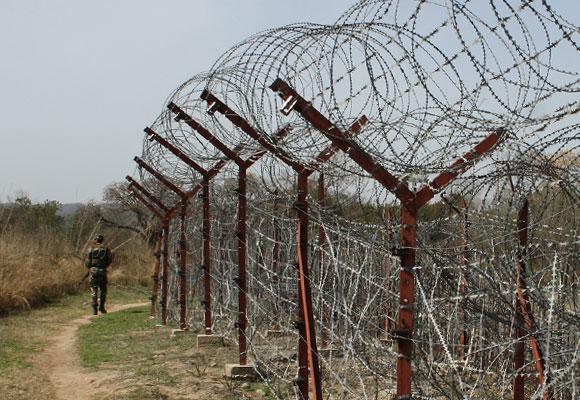
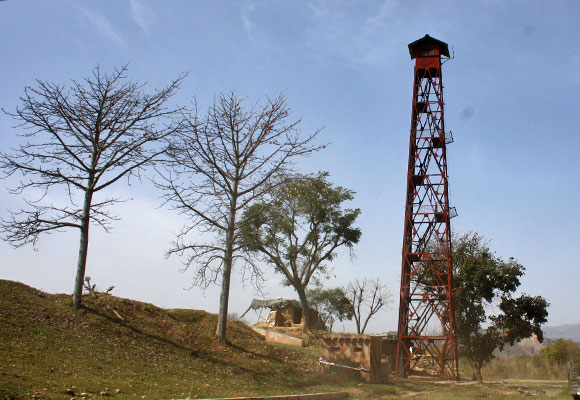
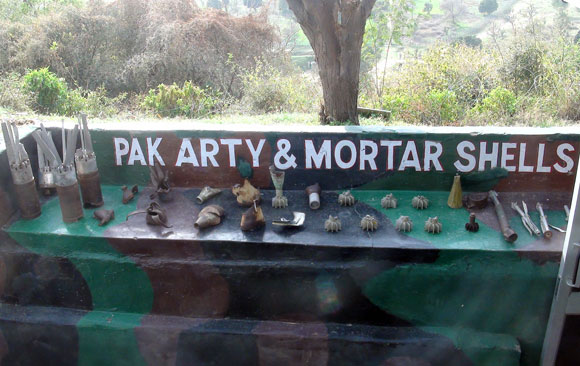
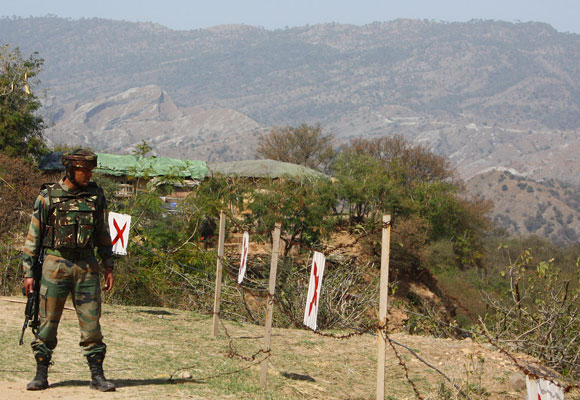
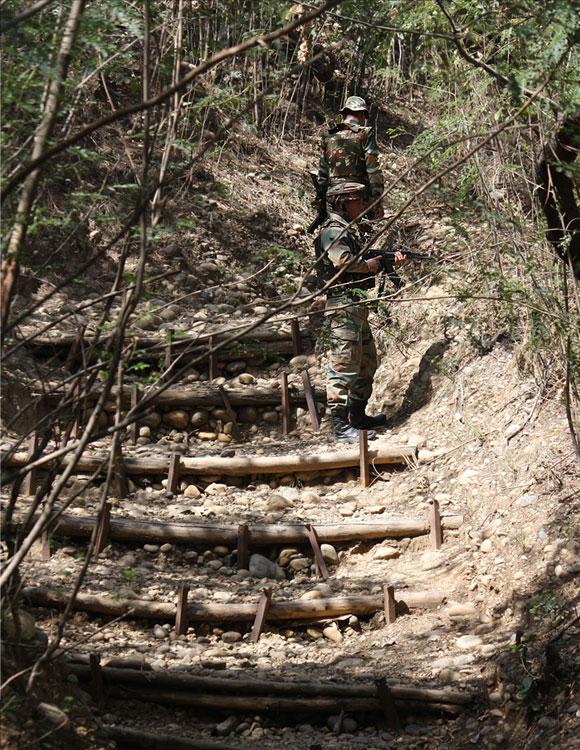
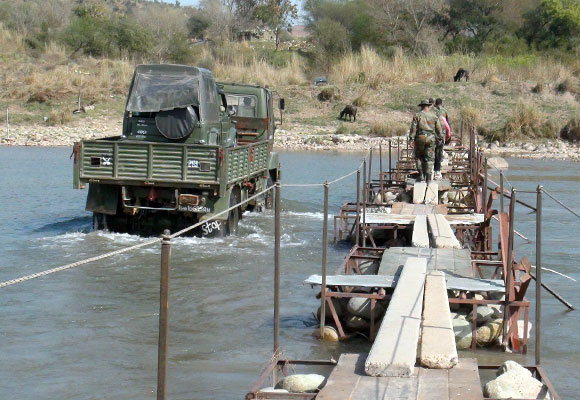
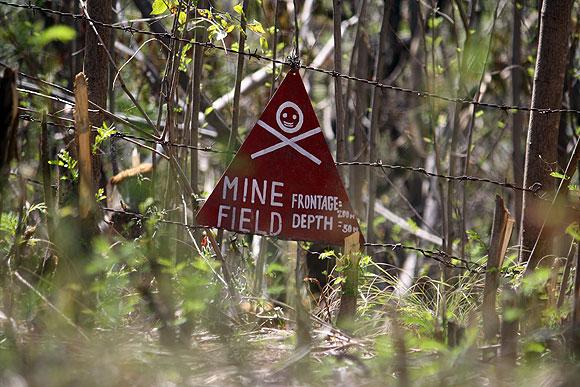
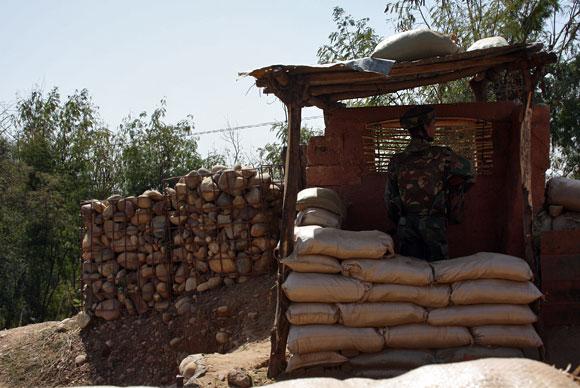
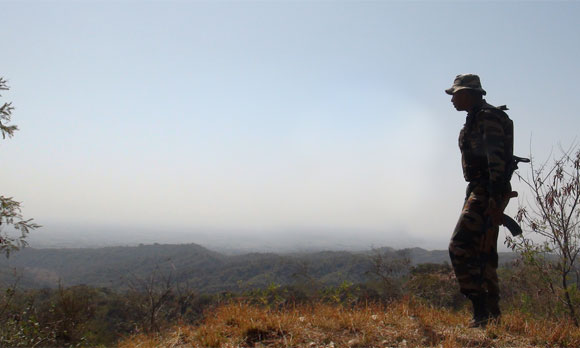
article